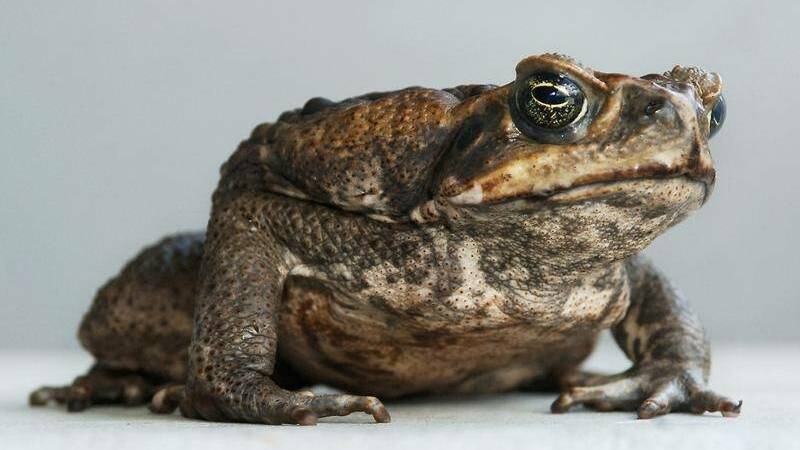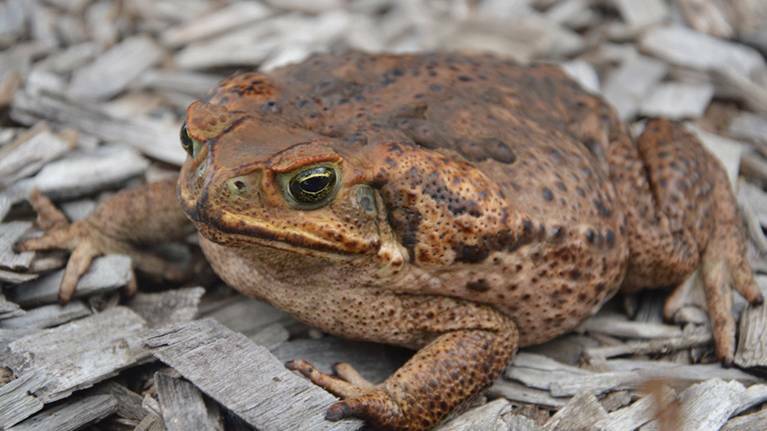
An animal welfare group wants Territorians to stop using clubs or even golf sticks to kill cane toads.
Subscribe now for unlimited access.
or signup to continue reading
Instead people living in cane toad areas across northern Australia should attend workshops "to teach and promote effective and humane methods" to combat the loathsome pest.
The RSPCA has told the Federal Government to consider setting up "local resource centres which can accept caught toads to be killed humanely and disposed of and to have available equipment and materials for hire, loan or purchase".
"It is essential to consider that even though cane toads are considered a major pest and repulse most people, they are sentient animals and their welfare must be considered," the RSPCA says.
The society was making a submission to a new parliamentary inquiry to "examine the effectiveness of control measures to limit the spread of cane toads across Australia".
The inquiry held its first public hearing this week.
The inquiry's chair, NSW MP Andrew Gee, said cane toads are an increasing threat to the Australian environment, given their impacts on native species and biodiversity.
“Cane toads are toxic at all points in their life cycle, and with no known predators in Australia, their spread has been difficult to arrest,” Mr Gee said.
“The committee is keen to understand how well current control measures are working in the fight against the spread of cane toads, and whether there are other measures that should be added to the toolkit."
Most recently One Nation leader Pauline Hanson suggested a reward of 10 cents for each cane toad killed, she did not specify how to kill them.
She also said the inquiry should be held in northern Australia, not in Canberra.
The NT Government told the inquiry the cane toad was basically out of control of the Territory with little hope now of stopping the rise in populations.
The cane toad was introduced into Australia in 1935 by the Queensland Bureau of Sugar Experiment Stations after reports of cane toads being used to control cane beetles in Hawaii and Puerto Rico.
Within five years the government released more than 60,000 young cane toads into Queensland.
Almost 85 years later it is estimated that cane toads occupy almost two million square kilometres in northern and eastern Australia.
They have decimated native populations of goannas, snakes and freshwater crocodiles, among other species, and are a major hazard to pet owners across the Top End.

They remain a major killer of dogs.
The NT's Department of Environment and Natural Resources lodged a submission to the inquiry stating cane toads are widespread across the northern part of the NT Northern Territory extending as far south as Newcastle Waters.
They have become established on some islands off the Top End coast, the department said.
"However, many NT islands remain free of toads, including Melville, Bathurst, Pobasso Island and Astell Islands and Groote Eylandt, all of which have high conservation values.
"Melville and Bathurst Islands and Groote Eylandt are three of Australia’s largest offshore islands and are critically important refuges for a range of species, including many threatened species that have undergone severe declines on the mainland, such the northern quoll, brush-tailed rabbit-rat, black-footed tree-rat, northern hopping mouse and flood-plains monitor.
"The northern quoll was translocated to Pabassoo and Astell Islands in 2003 in response to the collapse of Quoll populations on the mainland as a result of the spread of cane toads. These islands remain important refuges for this species."
The department said it had been impossible to prevent cane toads from spreading into suitable habitat without a sea barrier.
"Despite well targeted public education and community engagement campaigns, such as those undertaken in Darwin, Katherine and other NT communities before and during cane toad arrival, toads rapidly established in these areas, and no local eradication of cane toads has ever been achieved in the NT."
The department said it was now focusing its efforts on ensuring the toad-free islands stay that way.
Submissions to the inquiry have closed and public hearings to be held outside Canberra have not yet been announced.
While you're with us, you can now receive updates straight to your inbox each Friday at 6am from the Katherine Times. To make sure you're up to date with all the news, sign up here.

